Have you ever had a pet? If so, you know how heartbreaking it is to see them suffer, especially when they can’t tell you what’s wrong. That’s exactly how it is with toddlers and babies. They don’t know why it hurts, but they know that it does. I still remember the first time my little one fell sick. He cried nonstop, and I was completely nerve-wracked. Later, I found out he was having stomach pain. As a mom, I dove into everything I could, reading articles, consulting medical experts, and asking other parents for advice. I gathered all the information that made sense to me and turned it into a practical list. So here I am, ready to share it with you. If you’re also worried about chronic stomach pain in kids, I hope what I’ve learned can help you too.
Common Causes of Stomach Pain in Toddlers
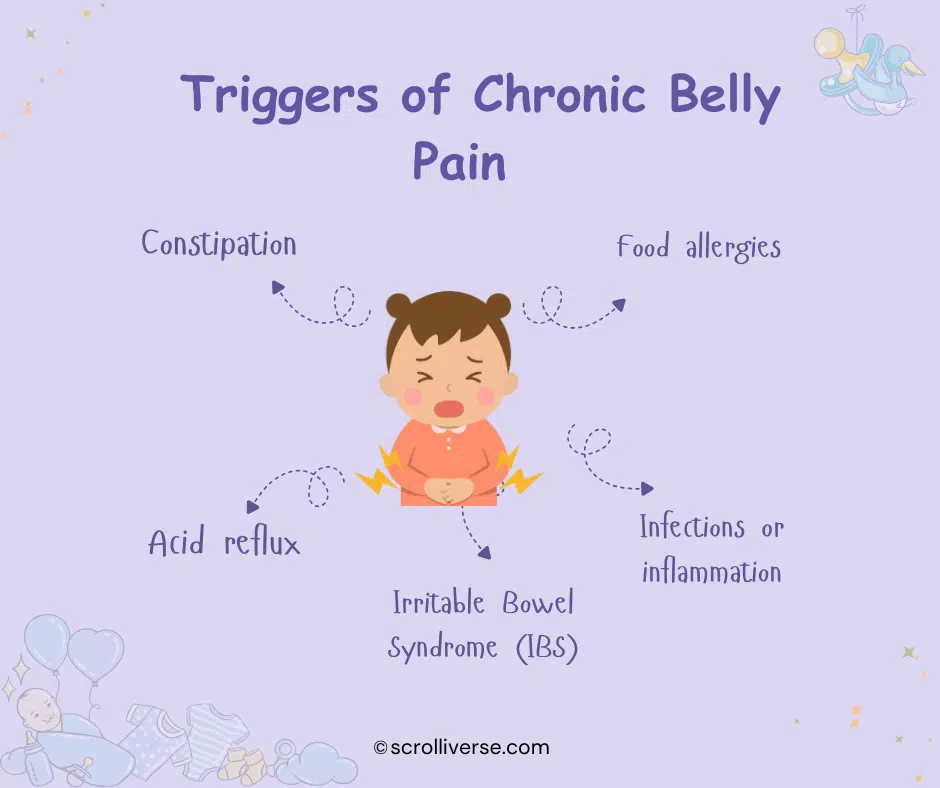
So basically, what happened is on a random evening, my little one started crying because his stomach hurt. I was so worried but felt helpless in that moment.
That’s when I realized how important it is to understand what might be going on. So, here, let’s talk about common causes of stomach pain in toddlers.
Indigestion
Well, we all know that toddlers have adventurous taste buds. One day, they want plain toast, the next they’re stealing bites of your spicy noodles.
Too much food, especially rich or greasy meals, can overwhelm their small stomach.
Once, after a birthday party, my son ate:
- A large slice of cake
- Handful of chips
- Full cup of juice
By bedtime, he was holding his belly and saying, “My stomach hurts.”
It passed after some rest, but it was a clear lesson in moderation for avoiding stomach pain in kids.
Gas
Okay, I get it that gas sounds harmless, but for toddlers, it can feel overwhelming.
They don’t always know how to “let it out,” so it builds up and causes cramps.
My daughter often gets gas after:
- Drinking milk too quickly
- Talking while eating in excitement
Certain foods, like beans, cauliflower, or even apples, can also make it worse for some children.
Sometimes this gas can make a toddler’s stomach pain at night worse, keeping them (and you) awake.
Constipation
This was the most common issue with my little one, and honestly? You should get used to it once toddlers start solids or begin potty training.
Some children feel nervous about using the toilet, so they hold it in.
This makes the stool harder and more painful to pass.
I remember my kid crying and dancing around, crossing his legs, clearly uncomfortable.
When I asked if he needed the toilet, he said, “No, tummy hurts,” but the cause was obvious.
At times, our pediatrician has recommended stomach pain medicine for kids, like children’s Pepto or kids’ Pepto, in safe doses for relief, along with hydration.
And while we’re on the topic, if you’re in the middle of potty training, finding the right baby diapers can make a world of difference in those tricky moments. Trust me, a good diaper can help keep things comfortable (and less messy). Check out these best baby diapers to make that transition smoother!
Mild Infections
- Stomach bugs spread quickly in daycare and playgrounds.
- Viruses like rotavirus can cause tummy aches, vomiting, and diarrhea.
My daughter once caught a bug from a playdate and had chronic stomach pain in kids’ symptoms for three days.
She was tired, pale, and only wanted cuddles. It took fluids, rest, and gentle care before she was herself again.
In cases like this, our doctor sometimes suggests medicine for stomach pain in kids to ease discomfort until the infection passes.
Food Sensitivities or Allergies
Some toddlers react to certain foods every single time they eat them.
Common triggers include:
- Dairy
- Gluten
- Eggs
- Nuts
I once noticed my son’s belly hurt after yogurt.
After a few episodes, our pediatrician suggested cutting dairy for a while.
The difference was huge.
Stress or Anxiety
Big emotions can lead to very real tummy aches, also known as stress stomach pain.
Moving to a new house or starting preschool can be stressful for toddlers. Before her first day of school, my daughter kept saying her tummy hurt.
Once she settled into class, the pain disappeared completely.
Sometimes stress even shows up as stomach pain when what they really need is comfort, not actual medicine.
Types of Stomach Pain in Toddlers
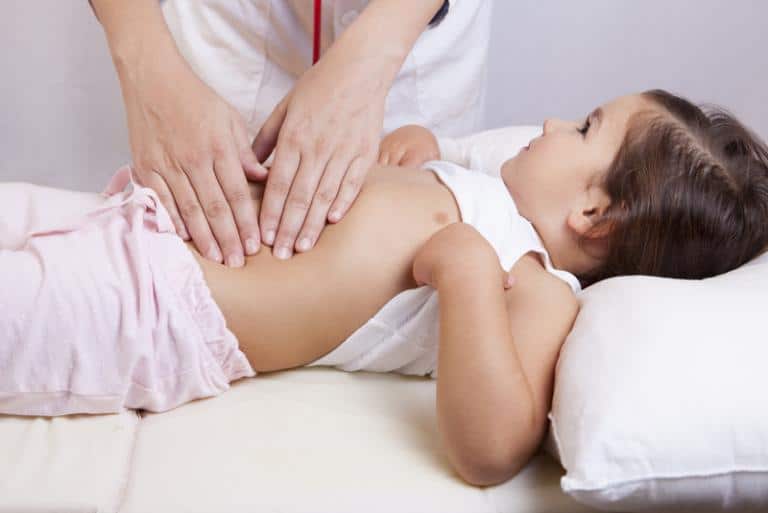
Credit: kidsclinic.sg
Now, it’s not just tummy pain. Understanding the kind of stomach pain your toddler is feeling can help you respond faster. Some discomfort is mild, but other times it’s a sign you need stomach pain medicine for kids or even a doctor’s care.
Knowing the differences is key to handling stomach pain in kids effectively.
Cramping Pain
Cramping pain comes and goes in waves.
It’s often caused by gas, constipation, or diarrhea.
Your kid may pull their knees to their chest or curl up tightly when it hurts.
So, you know, sometimes a warm compress helps, but if it’s late, it can turn into toddler stomach pain at night that disrupts everyone’s sleep.
Sharp or Sudden Pain
Sharp pain can be caused by gas, but not always. If the pain is severe and doesn’t pass, I call the doctor, and of course, you should too.
Certain conditions, like pain under the right rib cage or sore ribs right side, can point to more serious issues.
Once, my daughter had pain on one side and refused to walk.
It wasn’t from food; it was a bladder infection. In these cases, medicine for stomach pain in kids might help temporarily, but professional care is essential.
If you’re dealing with a toddler who’s in pain and feeling fussy, it’s important to focus on making mealtime a little easier. Choosing the right toddler plates that encourage self-feeding and are easy to clean can reduce stress around mealtime, and that might just help avoid some of those stomach complaints later on. Check out these best toddler plates to make feeding more fun and less messy.
Achy or Dull Pain
Achy pain feels like a slow, nagging discomfort. It often follows overeating or mild indigestion.
My son once had this after a barbecue.
We rested at home, skipped sports, and I gave him children’s Pepto in the dose our pediatrician recommended.
Upper Stomach Pain
Pain high near the ribs can be reflux or acid irritation. It’s common after lying down right after eating, which can also make kids wake up uncomfortable.
I’ve noticed smaller meals help prevent it.
Lower Stomach Pain
Pain low in the belly can be constipation or urinary issues. If your kid crying on the toilet is a regular sight, it’s worth checking with your doctor.
In rare cases, lower pain could be linked to other issues, like stomach pain when coughing, so it’s best to watch symptoms closely.
Safe Remedies for Toddler Stomach Pain
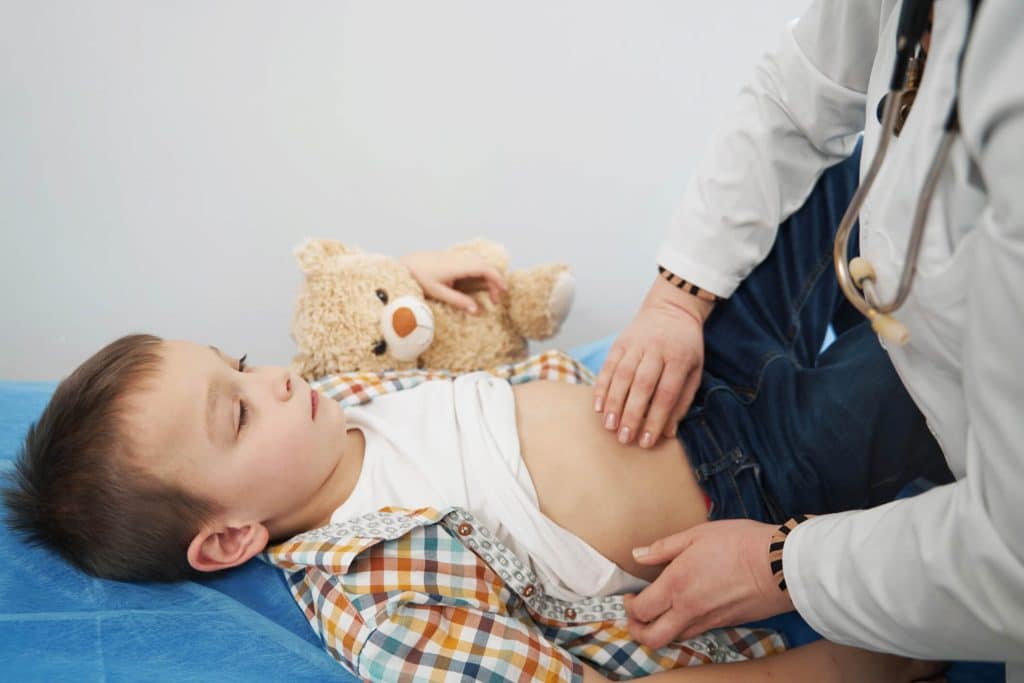
Credit: metropediatrics.com
When stomach pain in kids happens, parents need simple, safe solutions. These remedies can bring comfort while keeping your toddler safe from unnecessary treatments.
Warm Compress
Heat relaxes tight tummy muscles and eases cramping. Use a warm (not hot) towel or heating pad placed gently on the belly.
This can help with gas, cramps, or toddler stomach pain at night.
Hydration
Keep fluids going in small sips, not large gulps.
If there’s vomiting or diarrhea, offer oral rehydration solutions. This helps replace lost fluids and works like natural stomach pain medicine for kids. Ice chips can also be soothing if regular water feels hard to swallow.
Gentle Tummy Massage
A light circular massage, moving clockwise, helps release trapped gas.
It’s an easy way to calm bloating or cramping without relying on kids’ stomach pain medicine. This simple method works well when a kid crying from gas doesn’t know how to let it out.
Adjust Diet for the Day
Stick to bland foods like bananas, rice, applesauce, and toast.
Avoid heavy, greasy, or sugary foods until the stomach settles. Offer smaller, lighter meals throughout the day.
Encourage Rest
Rest is one of the best natural remedies. A quiet space, a favorite toy, and downtime can ease stress and stomach pain.
Mild Over-the-Counter Options
Some gentle options are safe when approved by your doctor. Children’s Pepto can sometimes be used in the right dose.
If pain appears as pain under the right rib cage, sore ribs right side, or stomach pain when coughing, it’s best to seek medical advice first.
Tips to Prevent Future Stomach Aches

Credit: healthline.com
Now few mom tips from my side because I know how tough it gets.
- Offer balanced meals.
Half the plate fruits and veggies, a small portion of protein, and some whole grains.
- Keep them hydrated.
Water throughout the day, especially in warm weather.
- Limit processed snacks.
Swap chips for cut-up fruit or yogurt.
- Encourage regular bathroom breaks.
Toddlers get busy playing and forget to go.
- Teach slow eating.
We make a game of counting chews to slow things down.
- Watch for food triggers.
I keep a simple food diary if pains keep coming back.
When to Call the Doctor?
Call your pediatrician if:
- Pain is severe or lasts more than a day.
- Fever comes with stomach pain.
- There’s blood in stool or vomit.
- Signs of dehydration appear, dry lips, no tears, and fewer wet diapers.
- Pain is on the right side and constant, which could be appendicitis.
Once, a fellow mom told me that her son had right-sided pain and no appetite. She went to the doctor, and it was early appendicitis. Catching it fast made all the difference.
Ending Remarks
As we come to the conclusion, I think by now you have pinpointed the reasons for chronic stomach pain in kids. Just watch for symptoms, and your little one will thank you.
Frequently Asked Questions
Still have questions? Let’s uncover some of them.
When should I worry about my toddler’s stomach pain?
If the pain is severe, lasts more than 24 hours, or comes with fever, vomiting, or blood in stool, call your doctor right away.
Can I give my toddler over-the-counter medicine for stomach pain?
Some options, like children’s Pepto, may be safe, but only in doses approved by your pediatrician.
Why does my child’s stomach hurt in the morning?
Sometimes stomach hurts in the morning due to mild indigestion, gas, or even stress and stomach pain from school or routine changes. If it keeps happening, talk to your doctor.
What foods should I avoid when my toddler’s stomach hurts?
Skip greasy, sugary, or heavy foods. Stick to bland foods like bananas, rice, applesauce, and toast until their stomach ache feel better.
Can stress really cause stomach pain in kids?
Yes, big emotions often show up as tummy aches in little ones.
Starting preschool, moving homes, or even a change in routine can trigger chronic stomach pain in kids linked to stress.

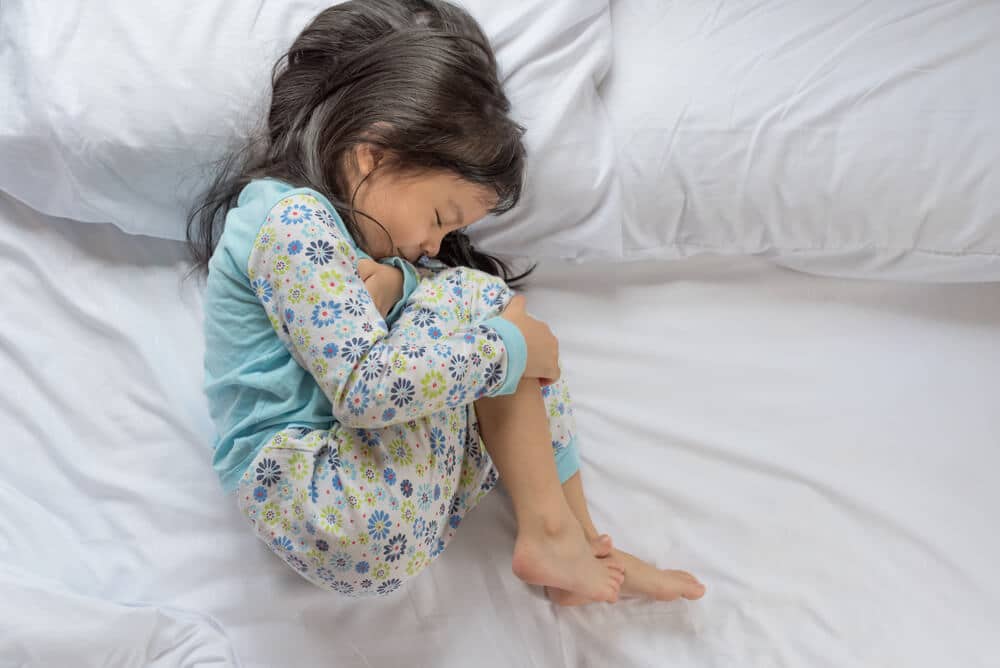


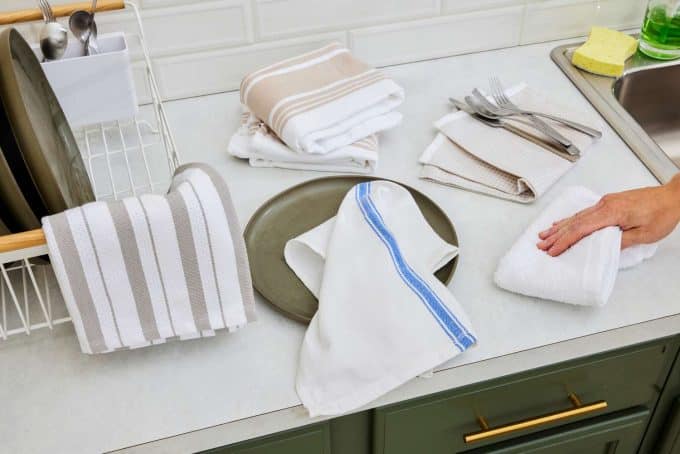















Leave a comment